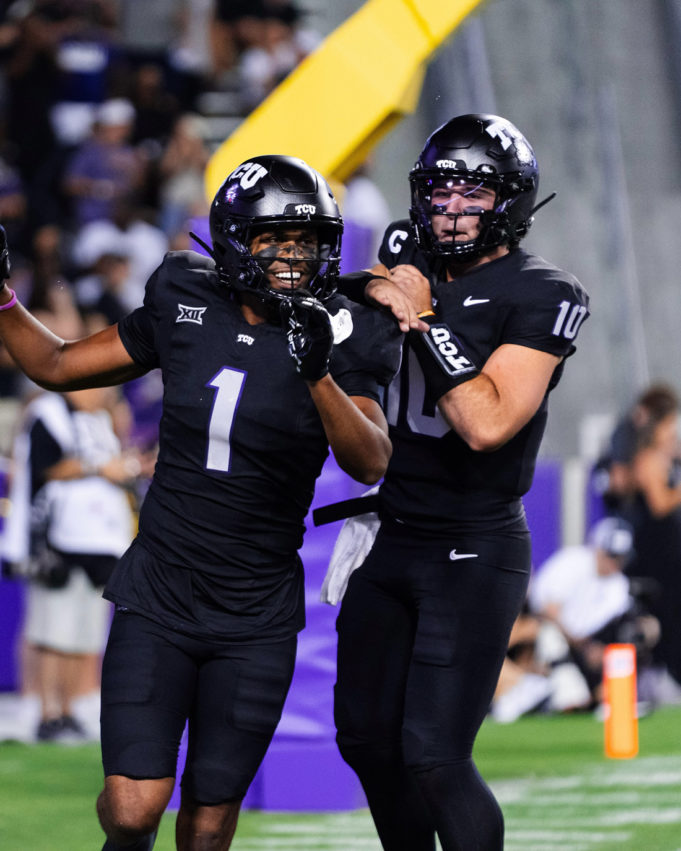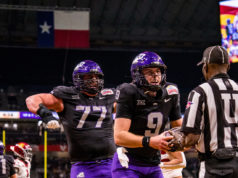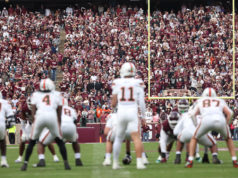What was supposed to be a grudge match between undefeated powerhouses quickly devolved into a shellacking in which attackers were relegated to the defensive backfield and the Cobras scored only once during garbage time. Meanwhile, the Gladiators maintained their dominance with eight goals and an unbeaten record.
Whoops, that was actually the opening to my weekly soccer newsletter for the 8U squad I coach on Saturday mornings.
The Frogs’ story is one of two teams looking for redemption after close losses — both games in which they built substantial leads — the week before. TCU were two-score favorites at home against Coach Deion Sanders and the visiting Colorado Buffaloes, a game that both teams needed to win to maintain even a hope of being conference-relevant moving forward. After an absolute parade of sacks against Arizona State the week before, TCU’s offensive line was both a point of concern and focus for the Frogs on Saturday, and two plays into the game, starting left tackle Ryan Hughes (#70 — arguably the most important spot outside of the center) headed to the locker room on crutches.
Both Eric McAlister (#1) and Kevorian Barnes (#2) returned from injury in a limited capacity on Saturday and were probably the difference in a game in which the offense didn’t find the endzone until almost halftime and arguably didn’t find a true rhythm at all. The Frogs, who had legitimate questions about their ability to play from behind, were thrust into a hasty 14-point deficit. The defense — though they took time to settle in — kept their compatriots in the fray by picking off Kaidon Salter (#3) three total times in the first half, and Defensive Coordinator Andy Avalos quickly realized that Salter could not improvise in the passing game outside of scrambling and adjusted his pressures to Colorado’s detriment.
On its face, the offense was efficient. Thirty-five points and zero turnovers would certainly suggest that, but watching the game and the progression of that phase was laborious to say the least. When the Frogs were down by 14 in the second quarter, it was hard to even root for them to right the ship. B(r)ile(s) filled my throat. Offensive Coordinator Kendal Briles’ offensive line with no help, or push, failed to establish a rushing game yet again, and QB Josh Hoover (#10) seemed to still be hungover from a Friday night in Tempe that was among his worst career performances.
A sustained drive during the second quarter, followed by a second interception, allowed the Frogs to close the gap before halftime, and Salter just never seemed to recover from tossing three takeaways in one half. That said, neither team scored again until the fourth quarter, and as soon as the Frogs took the lead, the Buffs answered back straight away.
There was a flashpoint moment midway through the fourth quarter when TCU attempted fourth and 1 at midfield, and Hoover hit a short pass to tight end DJ Rogers (#0) who rumbled to a 43-yard gain close to paydirt. That play was called back due to a phantom offensive pass interference call, and the Frogs were forced to punt. That punt dropped directly onto a CU player’s back, and TCU recovered with a fresh set of downs and only 27 yards to take the lead, which they did. It was incredibly fortunate for Frog Nation that a bad penalty wasn’t the difference in this game, and it too easily could have been.
The final TD between Hoover and McAlister was a somewhat unnecessary fourth-and-6 in Colorado territory with 26 seconds remaining. Hoover hit McAlister on a gorgeous toss that Hoover later admitted he’d called at the line and partially because backup place kicker Nate McCashland (#99) missed wide right during the first quarter. TCU’s short-yardage under-center sneak made an appearance or two — which was nice to see — but that didn’t stop Briles from overcomplicating a first-and-goal from the 1-yard-line which resulted in an offensive pass interference and the eventual missed field goal.
When all was said and done, TCU needed a plus-4 turnover margin to win a close game at home after crawling out of a two-score hole. That is not what a good team does. Barnes — despite coming back from injury and still somewhat limited — carried 16 times for fewer than 50 yards, and the Frogs went yet another week without 100 cumulative rushing yards, despite 35 attempts on the ground.
As a fan, I like to win. As a pragmatic observer of the progress of a program, Briles’ playcalling and so-called system are a liability toward a sustainable team that at some point won’t have a draft-worthy quarterback and receiver duo in Hoover and McAlister. If either of those players — for whatever reason — aren’t on the field, then the system doesn’t work and should concern everyone, as I’m sure it privately does Head Coach Sonny Dykes.
This defense occasionally looks like a purple pasta colander with opposing rushers flowing everywhere, but they make essential plays and keep the team in games. Avalos is also proving himself capable in mid-game and halftime adjustments. He is earning his money, and this is the best defensive play we’ve witnessed during Dykes’ tenure.
The Frogs are 4-1 heading into the Purple Pit in the Little Apple of Manhattan, Kansas, against a reeling Wildcat squad who lost thanks to a blocked field goal in Waco last weekend. Kansas State is an uncharacteristic 2-4 and enduring a disappointing season, having already lost conference matchups to Iowa State, Arizona, and Baylor, as well as a nonconference game against Army. State’s offense — which has been prolific even while losing — runs through junior quarterback Avery Johnson (#2), who Frog fans are bitterly familiar with, as well as his abilities as a rusher, despite also being a completely serviceable or better passer.
Baylor and Arizona State also have signal-callers in the model of Johnson, and Avalos’ defense will have to emphasize a more controlled rush while maintaining lanes so Johnson can’t slip out for big gains. I expect the ’Cats to score at least 28 points in front of their home crowd, so the quantity of slippage allowed from Hoover and company to gel must be minimized for TCU to leave the cornfields still relevant in the conference race.
Oddsmakers have been Amazon-esque with the accuracy of their spreads the last two weeks, and the Frogs are currently favored by a point and a half. Whether or not TCU covered the spread the last two weeks depends almost entirely on when you placed the wager. For that reason, I wouldn’t advise betting on your hometown favorites, or maybe anyone in the Big 12, for the rest of the season.
Frog fanatics are — and have been over the last two weeks — really in for it. Is this team good or bad? Yes. The Frogs, based on all existing evidence, are above average, which is almost the worst possible status in major college football: not good enough to give you hope or confidence, not bad enough to exact meaningful or imminent change.
Our conference more than ever seems to be one of parity. We’re likely to see every game remaining on the schedule to be a tossup based on how well the offense clicks, which is always how things have been under Briles. There is no system — the great players make big plays, or they don’t. Credit where it deserves to be. It’s all on Hoover and company, because there’s nothing to fall back on, which is not how a high-level program operates.












